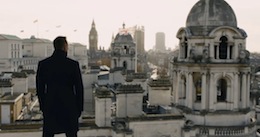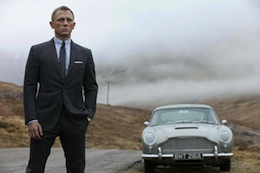 After financial problems at MGM delayed 007’s next mission for a couple of years, Skyfall finally arrives, and it’s a spirited return. One that manages to stay true to the tenets of the 50-year franchise, while challenging the characters and underlying message of a series that has been at times silly, at times uneven and at times outright bad.
After financial problems at MGM delayed 007’s next mission for a couple of years, Skyfall finally arrives, and it’s a spirited return. One that manages to stay true to the tenets of the 50-year franchise, while challenging the characters and underlying message of a series that has been at times silly, at times uneven and at times outright bad.
This is largely thanks to first-time Bond director Sam Mendes and a script that isn’t afraid to link action to reaction, however troubling the result.
Daniel Craig reprises his role as James Bond, bringing the same combination of world-weariness and sense of duty to the character that has served him so well in the last two films. Craig’s Bond is tired. And the film’s opening chase sequence follows him as he puts his life at risk for Queen and country for the thousandth time. The details Mendes chooses to focus on during the opening are telling. Bond stops to stabilize a fallen teammate, only to be called back to task by M, played again by Judy Dench. The director also focuses on the physical toll of this early chase, which ends in dramatic fashion, even for the series that has given us no shortage of those.
 What follows is a movie that is equal parts action and motivation. There are jaw-dropping set pieces in Skyfall, yet some of the more affecting moments are quiet and private. As the plot changes from international mystery to revenge story to home defense/giant metaphor, the clean, do-no-wrong exteriors of these characters that have been established over the last 50 years fade away. The good guys aren’t always good. They don’t always do the right thing, such as save the girl and look good doing it – that was touched on in Casino Royale – but is deftly confirmed here.
What follows is a movie that is equal parts action and motivation. There are jaw-dropping set pieces in Skyfall, yet some of the more affecting moments are quiet and private. As the plot changes from international mystery to revenge story to home defense/giant metaphor, the clean, do-no-wrong exteriors of these characters that have been established over the last 50 years fade away. The good guys aren’t always good. They don’t always do the right thing, such as save the girl and look good doing it – that was touched on in Casino Royale – but is deftly confirmed here.
But what’s more, the villain isn’t always a power-hungry megalomaniac with plans of world domination. Sometimes, like in the case of Javier Bardem‘s Silva, he’s someone who has been betrayed and wronged by the same people he took an oath to protect.
Unsurprisingly, Skyfall is the most visually stunning entry in the 007 franchise. That’s what you get when you hire Roger Deakins to shoot it. Here, world-class director of photography Deakins plays with light and shadow in ways that make even boilerplate moments memorable. An early fight scene is entirely backlit, with the neon glow from billboards in the background serving as the only light source. Later, he shoots the Scottish Highlands with the kind of majesty that had to make the country’s tourism board smile.
If Skyfall has a major shortcoming it’s the length, which could be cut by about 15 minutes, possibly 20 and would be better served for doing so. The film’s third act sags a bit with a chase that never becomes that compelling and its final battle is smaller, and intended to be more of a metaphor, but it doesn’t adequately reach the emotional heft it hoped to achieve.
But in all, Skyfall is the rare franchise action movie that has it both ways. The legacy of the character is preserved, while the character himself changes. The film asks some difficult questions about duty and patriotism and gives answers that are both chilling and reassuring. And the same sense of bombast and epic sense of scale remains intact, but is injected with a sense of consequence that previous entries lacked.
And beyond that, it’s bloody good fun.




Comments on this entry are closed.